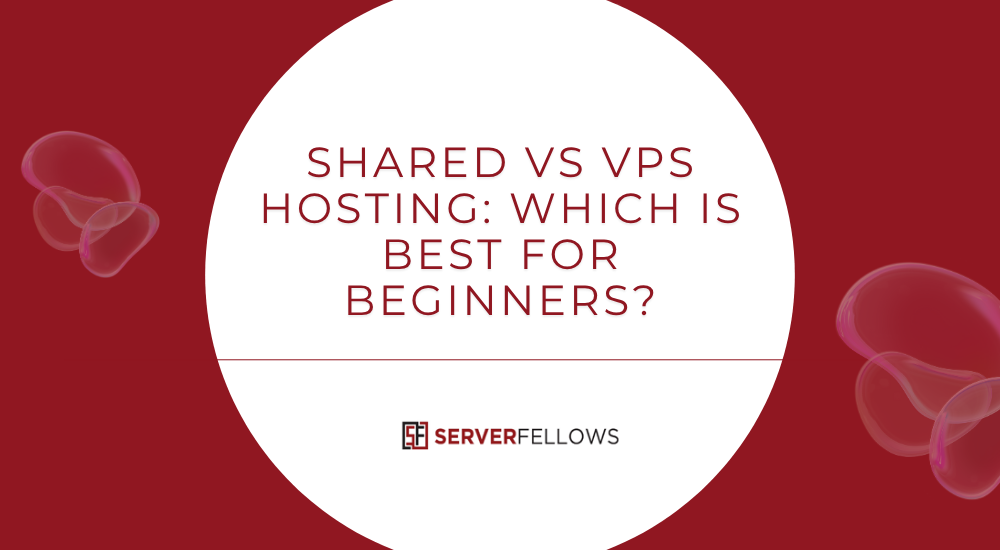
Shared vs VPS Hosting: Which Is Best for Beginners?
When building your first website, one of the most important decisions you’ll make is choosing between Shared Hosting and VPS Hosting. Both have unique advantages, but understanding their differences is key to setting your site up for success.
If you’re just starting out and want reliable, beginner-friendly hosting, check out Serverfellows.com — affordable plans built for long-term growth.
What Is Shared Hosting?
Shared hosting is the most common type of hosting for beginners. Multiple websites are hosted on the same physical server and share its resources such as bandwidth, disk space, and CPU power. This setup allows hosting providers to keep prices low and make web hosting accessible for everyone.
Think of it like sharing an apartment — you get your own room (your website), but utilities like water and electricity (server resources) are shared with others.
Advantages of Shared Hosting
- Cost-Effective: Shared hosting is the most affordable option. It’s ideal for individuals or small businesses that want to get online quickly without a big investment.
- Low Maintenance: The hosting provider handles updates, security patches, and server management. You can focus on your website instead of worrying about technical tasks.
- Easy to Use: Shared hosting usually comes with control panels like cPanel or Plesk, which simplify website management, domain setup, and email creation.
Disadvantages of Shared Hosting
- Performance Limitations: Since resources are shared, your site’s speed may slow down during traffic surges or if other sites consume more resources.
- Security Risks: If another site on the same server is compromised, there’s a chance your site could be affected too.
- Limited Scalability: Shared hosting plans offer restricted resources, making them less ideal for growing websites or eCommerce stores.
If your site is small or just starting out, shared hosting from Serverfellows.com offers an affordable and reliable way to launch.
What Is VPS Hosting?
VPS (Virtual Private Server) Hosting bridges the gap between shared and dedicated hosting. It uses virtualization technology to partition one physical server into multiple private environments. Each website on a VPS operates independently, with its own dedicated portion of resources.
Imagine living in a duplex — you share the same building but have your own kitchen, bathroom, and utilities. VPS hosting provides similar autonomy in the digital world.
Advantages of VPS Hosting
- Superior Performance: Since resources are dedicated, your site runs faster and more reliably, even during high-traffic periods.
- Enhanced Security: VPS hosting isolates each account, reducing the risk of another user’s security issues affecting your site.
- Scalability: As your website grows, you can easily increase resources like RAM, storage, and CPU power.
- Full Control: You can customize your environment with root access, install specific software, and configure server settings to your needs.
Disadvantages of VPS Hosting
- Higher Cost: VPS hosting costs more than shared hosting, though it remains more affordable than dedicated servers.
- Technical Knowledge Required: Setting up and maintaining a VPS may require a basic understanding of server management.
- Overkill for Small Sites: If your website receives little traffic, you may not need the power of a VPS yet.
When your website begins to outgrow shared hosting, you can upgrade smoothly to VPS hosting through Serverfellows.com — migration is free and seamless.
Shared vs VPS Hosting: Key Differences
To understand the Shared vs VPS Hosting debate better, here’s a detailed comparison of both hosting types:
| Feature | Shared Hosting | VPS Hosting |
|---|---|---|
| Price | Most affordable | Higher cost but better performance |
| Performance | Slower during peak hours | Fast and consistent |
| Security | Shared environment, higher risk | Isolated, more secure |
| Customization | Limited | Full root access available |
| Scalability | Difficult to scale | Easily upgrade resources |
| Technical Skill Needed | Minimal | Moderate |
| Best For | Blogs, portfolios, small sites | Growing businesses, online stores |
When to Choose Shared Hosting
Shared hosting is perfect for:
- Personal blogs or portfolios
- Small business websites
- Startups testing an idea
- Low-traffic informational sites
If your primary goal is affordability and simplicity, shared hosting from Serverfellows.com can help you launch without breaking the bank. You can always scale up when traffic grows.
When to Choose VPS Hosting
VPS hosting suits websites that need more power, control, and security. It’s ideal for:
- Medium to large websites
- eCommerce stores
- High-traffic blogs or communities
- Developers testing multiple applications
A VPS offers stability and performance that shared hosting cannot match. If you want your website to load faster and handle traffic efficiently, Serverfellows.com has powerful VPS plans designed for scalability.
Shared vs VPS Hosting for Beginners: How to Decide
If you’re still unsure which hosting type is right for you, here’s a quick way to decide:
- Budget: Start small with shared hosting if you’re on a tight budget.
- Traffic Expectations: Choose VPS hosting if you expect rapid growth or consistent visitors.
- Technical Skills: Go for shared hosting if you prefer the provider to handle all maintenance.
- Future Plans: Consider VPS hosting if you’re planning to expand your site or run multiple applications.
A flexible approach works best — start with shared hosting, and upgrade to VPS when needed. Serverfellows.com allows smooth transitions between plans, ensuring your website grows without downtime.
How VPS Hosting Improves Performance
Unlike shared hosting, where resources are divided among many users, VPS hosting allocates dedicated CPU, RAM, and storage to your account. This ensures:
- Faster page loading
- Higher uptime
- Better SEO ranking
- Improved user experience
If performance is a priority, VPS hosting will give your site the competitive edge it needs to rank and retain visitors.
Cost Comparison: Shared vs VPS Hosting
| Aspect | Shared Hosting | VPS Hosting |
|---|---|---|
| Starting Price | Typically under $3/month | Around $10–$20/month |
| Resource Allocation | Shared | Dedicated slice |
| Value for Money | Best for beginners | Best for scaling websites |
While shared hosting wins in affordability, VPS hosting delivers far more value per dollar when performance and uptime matter.
At Serverfellows.com, both options are competitively priced, making it easy to choose the right plan for your needs.
Security Comparison
Security is a vital factor in the Shared vs VPS Hosting discussion. Shared hosting relies on the provider to protect all sites on the server — if one site is infected, others could be affected. VPS hosting, however, isolates your environment completely, minimizing such risks.
VPS hosting allows for:
- Custom firewalls
- Advanced malware protection
- SSL configuration
- Server monitoring and backups
If you run a business that handles customer data, VPS hosting ensures compliance and peace of mind.
Migration Made Easy
One concern many beginners have is how to move from shared to VPS hosting. With Serverfellows.com, the migration process is effortless. Your data, databases, and configurations are safely transferred without downtime. You don’t need technical expertise — their team handles it for you.
This makes it easy to start small and scale confidently when your website needs more power.
FAQs on Shared vs VPS Hosting
Is Shared Hosting Good for Beginners?
Yes. It’s simple, affordable, and perfect for new website owners with small traffic volumes.
When Should I Upgrade to VPS Hosting?
Upgrade when you notice slower load times, increased traffic, or resource limits. VPS hosting ensures consistent performance.
Is VPS Hosting Secure?
VPS hosting offers isolated resources, meaning your site won’t be affected by others on the same server.
Can I Move from Shared to VPS Hosting Without Downtime?
Yes. Serverfellows.com provides free migration with zero downtime, making the switch smooth.
Which Is More Cost-Effective in the Long Run?
While shared hosting is cheaper upfront, VPS hosting offers better long-term value as your site grows.
Conclusion
The Shared vs VPS Hosting debate ultimately depends on your goals and stage of growth. Shared hosting is ideal for beginners who want simplicity and affordability. VPS hosting, on the other hand, provides speed, flexibility, and security for scaling websites.
The best part? You don’t have to commit to one forever. Start small and upgrade as your website evolves.
If you’re ready to launch your website, explore the flexible shared and VPS hosting plans at Serverfellows.com — optimized for performance, reliability, and effortless growth.


